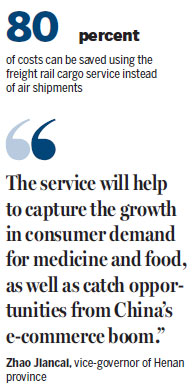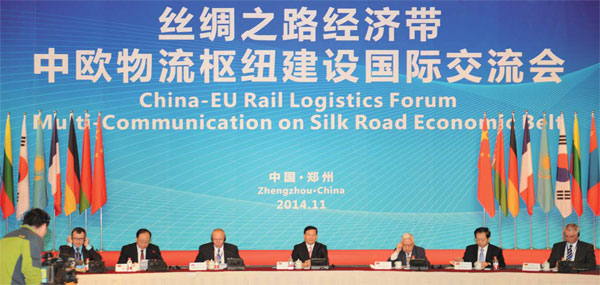European rail route upgrade to boost trade
Updated: 2015-04-24 07:45
By Shi Baoyin(China Daily)
|
|||||||||||
In anticipation of rising trade volumes brought about by the Silk Road Economic Belt, Henan, a Central China province, will add more customized services to its international cargo railway line to Europe in the second half of this year.
The Silk Road Economic Belt, an initiative put forward by President Xi Jinping in 2013, is being established along the ancient Silk Road, which stretches northwest from China's coastal area through Central Asia to Europe.
The upgraded railway line will offer temperature-controlled and more e-commerce related transport services to enhance its earning ability in the second half of this year.
Zhao Jiancai, vice-governor of Henan, said the temperature-controlled rail cargo service would be introduced on the route in June.
He said the province's current international cargo rail service offered large international brands economic solutions with high speed, reliability and sound safety standards.
"The service will help to capture the growth in consumer demand for medicine and food, as well as catch opportunities from China's e-commerce boom.
The online demand for healthcare, food and drink products will certainly surge over the next five years," said Zhao. "We believe that such a high standard service is critical to help us gain more clients in both Chinese and European markets."
The temperature-controlled service will provide an all-year multi-modal shipping solution for temperature-sensitive European products, such as German medicines, Belgian chocolate, Dutch dairy products and French wine to China, which was previously unable to use the fast and cost-effective transcontinental west rail corridor, especially during winter and summer.
The rail route was jointly launched by Henan provincial government and DB Schenker, the transport and logistics arm of Deutsche Bahn, the rail route's main partner outside China, in July 2013. The freight train takes 16 days to make the 10,214-kilometer trip, which is more than twice as fast as maritime transport.
The route reaches Hamburg in Germany via Kazakhstan, Russia, Belarus and Poland. Zhengzhou International Inland Port Development Co is responsible for cooperating with partner rail companies in each country.
The freight rail cargo service can save 80 percent of transport costs compared with air shipments and is about $490 cheaper per container on average compared with road transport.
Since 2010, other Chinese cities, including Chengdu, Chongqing, Xi'an and Wuhan have all launched weekly or monthly modern block train services to different European destinations.
However, with rich manufacturing and labor foundations, China has long had a trade surplus when doing business with the majority of its partners in Europe. Chinese trains usually return empty.
Zhao said the Zhengzhou-Hamburg international railway line is one of a few Chinese railway routes that operate bidirectional services after agreements were made with various European wine, industrial parts and pharmaceutical suppliers and producers to transport their goods on block trains rather than by air.
"With more European products and parts shipped to Zhengzhou through regular railway services, foreign companies seeking investment opportunities in China will be more inclined to establish their regional headquarters, branches and manufacturing facilities in the provincial capital," said Luo Renjian, a researcher at the Beijing-based Institute of Transportation Research of the National Development and Reform Commission.
Eager to grab more of a market share from competitors, the Zhengzhou-Hamburg international railway line already offers flexible transport options to both domestic and European clients. Services include online booking, free short-term warehouse storage and services for loads that are smaller than a container.
Sales offices in Warsaw, the German city of Duisburg, Shanghai and Hangzhou are also assigned to attract more manufacturers from different industries.
There were 100 batches of block trains with combined trade volume of $475 million and 52,200 metric tons of goods that ran between Zhengzhou and Hamburg by the end of 2014.
Supported by international rail and air transport facilities and a number of factories owned by big names including Siemens AG, 3M Corp, Canon and Foxconn Technology Group, the province's foreign trade volume surged to more than 399.44 billion yuan ($66.45 billion) in 2014, an annual increase of 7.5 percent, according to data released by Zhengzhou Customs.
"With many manufacturing companies moving their facilities to both Europe and inland China, there is an increasing need for logistics and transportation services in these two fast-growing markets," said Cui Shaoying, director of the Zhengzhou Economy and Technology Development Zone.
shibaoyin@chinadaily.com.cn
|
A German business partner of the international rail route joins the opening ceremony for the international freight service. |
|
A German business partner of the international rail route joins the opening ceremony for the international freight service. |

(China Daily 04/24/2015 page19)
Today's Top News
China plays down capital exodus
The real Apple Watchon sale Friday in China
US strike inadvertently killed US, Italian hostages
European rail route upgrade to boost trade
China and Russia to start search for Soviet soldiers' remains
Kim likely to visit Russia in May for war victory ceremony
Specialists discuss hot topics in China-EEC relations
Europe gaining importance in China's foreign investment
Hot Topics
Lunar probe , China growth forecasts, Emission rules get tougher, China seen through 'colored lens', International board,
Editor's Picks

|

|

|

|

|

|








